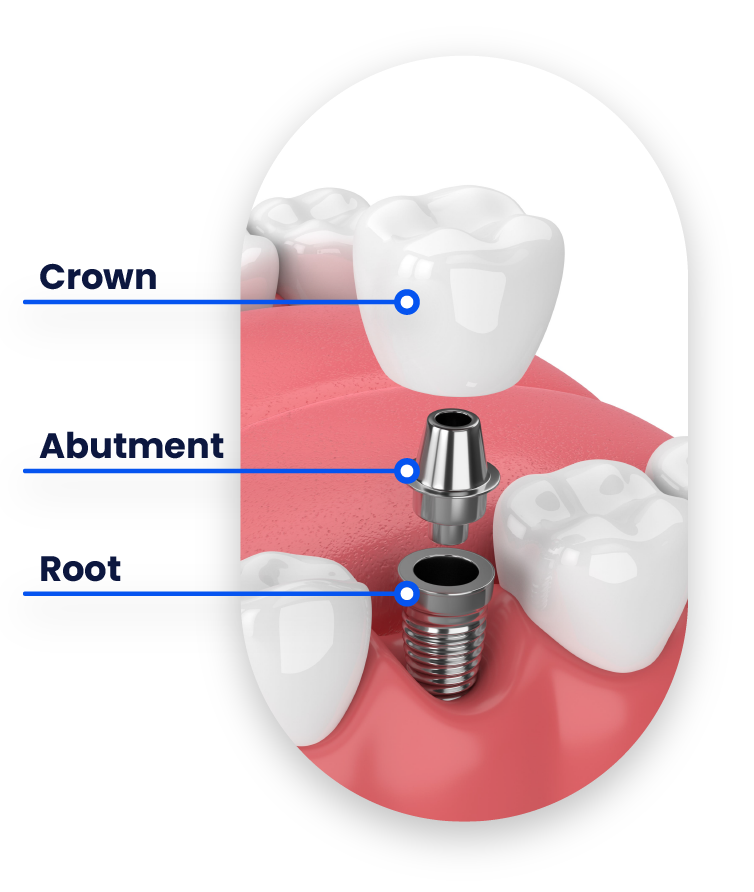Dental Implants in Memphis TN
Dental Implants in Memphis TN
OR CALL (901) 300-4162
Dental implants represent a significant advancement in the field of modern dentistry, providing a highly durable and reliable solution for tooth loss. Pioneers of this transformative practice are board-certified periodontists such as our doctors here at Periodontal Associates of Memphis. Their extensive expertise and proficiency ensure an elevated level of care and success in the dental implant process.
What are Dental Implants?
A dental implant is essentially a sophisticated, three-part artificial tooth. It consists of a root, which is a titanium screw embedded into the jawbone, an abutment that acts as a connector placed on top of the implant, and a crown, the visible part that mirrors the appearance of a natural tooth. The materials utilized in the construction of dental implants, including titanium and ceramic, are biocompatible and carefully chosen to mimic the function and aesthetic of natural teeth, thus ensuring a seamless blend with the patient’s existing dental structure.
Dental implants serve as an effective solution for various conditions such as tooth decay, gum disease, or injuries that result in tooth loss. Unlike bridges or dentures, dental implants offer a more natural feel and function, addressing not only the aesthetic drawbacks but also potential health implications of missing teeth.

Dental implants confer a myriad of benefits to the patient. They are known for their durability and, with proper care, can last a lifetime. Moreover, implants contribute positively to oral health by preventing bone loss that often occurs with tooth loss. They help maintain the integrity of the jawbone and prevent shifting of the remaining teeth. Furthermore, dental implants can dramatically improve an individual’s aesthetics and self-confidence. With the look and feel of natural teeth, implants allow patients to smile, talk, and eat with renewed confidence and ease.

The Dental Implant Process
Board-certified periodontists like Drs. Godat and King play an instrumental role in the dental implant process. Through rigorous training and a rigorous certification process, they acquire specialized skills and knowledge that set them apart in the field of dentistry. They are adept at managing the complexities of oral health, enabling them to effectively navigate patients through the entire dental implant journey. From initial consultation to post-surgery follow-up, their involvement is integral to ensuring successful implant placement and patient satisfaction.

A Personalized Approach
At Periodontal Associates of Memphis, we do strive to offer a more personal approach when providing dental implants to our patients. Once you have scheduled a consultation, we can assess the damage to your mouth and your teeth. This will help determine if restoration will be required to prepare your teeth for dental implants. We can also determine if one or more implants will be required as well as any teeth that need to be extracted. It is also important to ascertain if there is any periodontal disease present. An issue like this can impact whether the treatment is successful. The time of which the tooth has been missing can also lead to complications with the treatment.
MEET YOUR DENTAL IMPLANT EXPERTS
Dr. Godat, Dr. King & Dr. Byakina
Our doctors possess exceptional qualifications for effective implant treatments in Memphis. With advanced training and certification in implant dentistry, they offer the utmost care for this vital procedure. Their specialized expertise sets them apart, making them equipped to handle intricate cases uncommon among periodontists.

“I have been treating with Dr. King for a year now during this implant process and it has been the best experience I have ever had with Dental work. Today was my last visit and everything has been great since Day 1. I was nervous about the implant surgery but it was painless and I didn’t even need to take the pain meds afterwards because it was tolerable. Dr. King even took the time to call and check up on me later that day after the surgery. Now that is A+ service and I have never had a doctor do that before! His team is amazing and they take the time to explain everything that is going to happen and next steps. I would highly recommend Periodontal Associates and especially Dr. King and his team! Thanks again for everything!”
-Stephanie
Patient Results




Dental Implants FAQ
How much do Dental Implants cost?
How long is the process?
Installing dental implants is actually a two-part process. First the post is surgically attached to your jawbone. This part of the process takes between one and two hours. Then, you will wait a period of three months as the gums heal around the post. On your second visit, the cap can be installed on top of the post in as little as a few minutes.
Are Dental Implants worth it?
While they require some up-front cost, dental implants are a wise financial decision. The reason is because they are long-lasting, natural-feeling, and even help reduce bone loss, which can save money on expensive procedures down the line.
Is getting Dental Implants painful?
While some people may shy away from dental procedures because they are worried about the pain, the truth is that dental implants (and most dental procedures) come with only a small risk of pain. During the process, local anesthetic is used to numb the area around the implant.
Afterwards, the doctor can prescribe medications if they think you are at risk of suffering pain as your mouth heals. Often, over-the-counter medications are also effective.
How long do Dental Implants last?
One advantage of dental implants is that they are made to last for the rest of your life. Unlike regular teeth, they don’t decay over time, and are durable enough to stand up to a lifetime of use. Just be sure to keep your gums clean, as infected tissue surrounding the implant can lead to complications.
Can I get Dental Implants if I have Dentures?
When combining dentures with dental implants, it will be necessary to have a new set of dentures made, which can be shaped to fill the gaps left by your implants.
